Angela Slatter's Blog, page 41
May 27, 2017
Of Sorrow and Such artwork
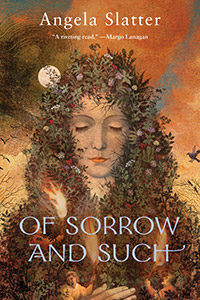 You can now buy an art print of the cover for Of Sorrow and Such!
You can now buy an art print of the cover for Of Sorrow and Such!
The wonderful Anna and Elena Balbusso Twins have it for sale here.
Plus (and I did not realise this), the illustration, “The Witch”, won two awards!
2017 SILVER AWARD 55th Annual Illustration Competition Society of Illustrators Los Angeles
2016 SPECTRUM 23 WINNER The Best in Contemporary Fantastic Art
Australian Writers’ Centre
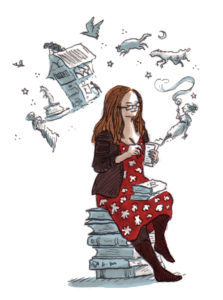
Art by Kathleen Jennings
I’ll be appearing at the AWC in Sydney on Friday 21 July 2017, 6-8pm, for a Masterclass on Fantasy writing.
It’ll be an in conversation event with the delightful and erudite Pamela Freeman.
For bookings, go here.
May 24, 2017
New Fears
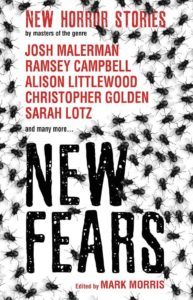 Delighted to see the cover for the new anthology from Mark Morris and Titan Books!
Delighted to see the cover for the new anthology from Mark Morris and Titan Books!
New Fears has stories from Alison Littlewood, Stephen Gallagher, Brady Golden, Nina Allan, Brian Keene, Chaz Brenchley, AK Benedict, Brian Lillie, Ramsey Campbell, Carole Johnstone, Sarah Lotz, Adam Nevill, Muriel Gray, Josh Malerman, Conrad Williams, Kathryn Ptacek, Christopher Golden, Stephen Laws and little old me.
The book will be out on September 19, and there will be a signing at the British Fantasy Convention over the weekend beginning September 29.
May 23, 2017
Domnall and the Borrowed Child: Sylvia Spruck Wrigley
 1. What do new readers need to know about Sylvia Spruck Wrigley?
1. What do new readers need to know about Sylvia Spruck Wrigley?
They should know that the sense of time and place in my stories is very variable. I’m German-American and I’ve spent more time living in Spain and the UK than I have in either of the countries that I come from. I am currently living in Tallinn, Estonia. I love to explore the nature of places (and culture and questions and homelessness) but sometimes people come to my stories with expectations based on the first thing they’ve read that I’ve written. So there’s this shared understanding, which is great, but then things don’t quite fit and I guess it can be confusing.
So sometimes I get confused email insisting on knowing where I’m from. And the answer to where I’m from is not an easy question to answer (and harder still for my son, who has never lived in any of the countries that he holds citizenship for, but has spent his lift split between two countries who don’t consider him a citizen).
I guess they should also know that Spruck is a middle name (although it is my mother’s maiden name and the name I commonly go by in Germany), so in order to find my work, they should be looking under W not under S.
2. When did you first decide you wanted to be a writer and can you recall the story that made you feel that way?
That’s so hard to answer! I remember Peter Beagle’s The Last Unicorn and Mary Stewart’s Crystal Cave series as being the books where I became aware that there was more to a story than just the story-shaped thing. I became aware of good writing and that the way of telling a story could be as important as the story itself.
I know I wanted to be a writer at a fairly young age. The first thing I wanted to be was the first woman on the moon but after that, I talked about being a writer. I don’t really know how that happened or where it came from, so I asked my mother:
What stuck with me is the middle school paper you wrote on free speech and you mentioned “pornography” and the free speech movement (Bob Brophy) and your teacher never responded to content (it was brilliant) but took off major points for surface level mistakes I think it’s good to say that there was not one epiphany (there seldom is) it a mounting trail of evidence that you could do better. And I don’t remember you ever not have a journal from age 7 on – and a need to capture ideas and put your thought on paper. And there was Reginald Clark before then and the power of words.
3. What was the inspiration for Domnall and the Borrowed Child?
I always wanted to go to Ireland, it seemed such a beautiful and magical place. And one night, I dreamt I had gone and the next morning, walking to work, I saw a big poster with green hills and stunning scenery in the window of the travel agents. I walked in on the spot. It was a coach tour to Scotland. I decided that was close enough (Hah) and walked in and booked a ticket. Turned out, I was the only bilingual person on the tour, so I got railroaded on the spot to translate, taking the German tourists around the Scottish highlands. I loved everything about it and ended up taking a job there for the season. I wrote a lot while I was there, mainly bad poetry. But the big thing was that I immersed myself in the myths and legends. We often drove for hours and I wanted to be able to tell the tourists about the countryside and keep them interested — although really, all that was expected of me was “And we will meet back on the bus in one hour”. There was no world-wide web at the time, of course, but people found ways of sharing stories anyway. In every village, there would be a small shop (at least one!) selling shortbread and cheap jewelry and cassette tapes of mediocre bagpipe playing. And in most of these shops, there were small pamphlets, just paper stapled together, of a local story written by someone in the village. Sometimes they were historical or to do with a specific building in the village or a battle that happened. I read those too. But the ones I loved were fantasy stories about the wailing woman of the ford and the sea-horse-monsters and the witch that lived on the hill. I bought every one that I could find and read them all. I wonder if you can still get these.
Later, I noticed that most Celtic mythology seems to be focused on the Irish myths, the banshee rather than the bean nighe, especially when it came to fairy lore. And it seemed like some of the old Scottish versions were getting confused and overwritten by these Irish stories.
Domnall and the Borrowed Child came as a part of those pamphlets I read back then and trying to make sense, in my own head, how the world would work from their point of view. That’s why, I think, there’s a sense of Domanll in a greater world, that this is just one piece of it. Because it was very deliberately part of something bigger.
4. Can you remember what the first fairy or folk tale was to make an impact on you?
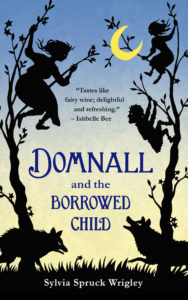
Cover art by Kathleen Jennings (of course!)
My first fairy tales were German. Max und Moritz, Struwwelpeter, die Heinzelmännchen. My mother got some flak for reading me the original Grimms Märchen when we moved to the US, because of the Evil Stepmother Queen dancing on hot coals until her feet fell off sort of endings. She says that the only time I got upset, though, was when she took me to watch the Disney version of Snow White. Apparently, I started sobbing when she was lost in the forest and just never stopped. My mother had to take me out and she never took me to see another Disney movie. Luckily, my dad did (don’t tell her).
I couldn’t tell you which had the most influence because fairy tales were such a pervasive part of my childhood.
5. How do you schedule your work day?
I’m not very good at waking up and doing things but over time it’s become clear that I do my best writing in the mornings, much to my disgust. So I try to plan things so that I can write in the morning before the rest of the world takes over my brain.
If I have a deadline, I’ll set the alarm an hour earlier to get extra writing time in but I’m not crazy about stealing sleep in order to get my writing done; eventually I turn into a witless zombie and fall over.
If I have the full day free to write, then I spend most of it browsing the web, so I try to make sure not to have the whole day free unless I have someone waiting for me: I react very well to deadlines and pressure.
I tend to work on a single project at a time; I’m not good at changing gears. So for example, I’ll work on an aviation book for a month straight and then put it aside and work on fiction, a short story or maybe a novel (I’m not good at novels but I’m working on it). I’m not one of those people with a dozen projects on the go. Or rather, I am, because I’m terribly addicted to shiny new ideas, but I work on them completely sequentially.
So the perfect work day, from a writing point of view, is two hours in the morning, followed by Everything Else That Needs Doing. I have the occasional binge days and when getting close to finished, I’ll spend more time. But for the bulk of the work, it’s done in that slot.
6. You can take five books to a desert island with you: which ones do you choose?
BIG THICK ONES. I’d be tempted to choose my old favourites, sagas that span decades, like Lord of the Rings and Thorn Birds and Pillars of the Earth. And as a kid, I devoured Roots and Gone with the Wind over and over and over. So I could see killing some time on the island with those although now I’m much more aware of the problematic perspectives so a lot of that time would just be ranting. If I could choose Song of Ice and Fire as a single book, I would take it, as I can imagine reading that repeatedly and finding new things every time. But I wouldn’t want the first five books as my entire reading material, that would be terrible.
The thing is, whatever books I took would get ruined in the sun and wind and wet really quickly. People talk about how much they love real books but what I love MOST about e-books is that I don’t have to decide what book to take with m e on holiday. I love the fact that I can keep them *all* in my bag and pick on the spur of the moment. So I’m going to cheat and say that I would take five Kindles.
7. Do you think fairy and folk tales will always have something to say to readers and writers?
Absolutely.
8. You’re an aviator – what attracted you to flying?
Help! I’ve written novellas on this subject, I’m not sure I can cover it in a paragraph or two. 
May 16, 2017
Books + Publishing
It’s nice when the industry mags notice! And you’re in excellent company! Thanks, Books + Publishing.
Australian authors shortlisted for Locus Awards
15 May 2017
Several Australian authors and illustrators have been named as finalists for the Locus Awards for science-fiction and fantasy writing.
Garth Nix is a finalist in the young adult category for his novel Goldenhand (A&U). Nix was previously a finalist in the same category in 2015 for Clariel (A&U).
Angela Slatter is nominated in the best first novel category for her debut novel Vigil (Jo Fletcher).
Author and illustrator Shaun Tan is nominated in the best artist category and the best art book category for The Singing Bones (A&U). Tan has previously won the Locus Award for best artist in 2011 and 2012.
The winners will be announced during the Locus Awards Weekend in Seattle from 23-25 June. To see the full shortlists, click here.
Shadows & Tall Trees #7: Rebecca Kuder
 Rebecca Kuder’s story, “Rabbit, Cat, Girl,” appeared in Year’s Best Weird Fiction, vol. 3. Her essays have appeared in The Manifest Station, Jaded Ibis Press, Lunch Ticket, and The Rumpus. She lives in Yellow Springs, Ohio, with her husband, the writer Robert Freeman Wexler, and their daughter. Rebecca blogs at www.rebeccakuder.com.
Rebecca Kuder’s story, “Rabbit, Cat, Girl,” appeared in Year’s Best Weird Fiction, vol. 3. Her essays have appeared in The Manifest Station, Jaded Ibis Press, Lunch Ticket, and The Rumpus. She lives in Yellow Springs, Ohio, with her husband, the writer Robert Freeman Wexler, and their daughter. Rebecca blogs at www.rebeccakuder.com.
1. What inspired your story in Shadows & Tall Trees 7?
It was born from an embryonic essay I wrote last spring speculating about what I would take to the curb for junk week. (We have an event in our town every year: you can drag just about anything to the curb and either another resident will harvest it or the garbage service will take it to the dump.) From the typed printout of the essay draft, I copied the words onto paper, writing longhand, using a kick-ass magical process inspired by the incomparable Lynda Barry (which I blogged about here). I allowed myself to veer from the original essay, transforming it into fiction. I do come from a lineage of packrats, though, which made writing this piece both creative and cathartic. (p.s. There truly was a dead canary in a family member’s freezer.)
2. Can you recall the first story you ever read that made you think “I want to be a writer!”?
I’ve wanted to be a writer since before I could read. Maybe Dr. Seuss was where it started. Horton Hears a Who. When I was seven, I wrote a story called The Hole in the Shirt. I dictated it to my father, and illustrated it. We mimeographed copies and sold them at the local sidewalk sale for .35 cents each. This was in 1974.
3. What scares you?
Our addiction to devices and social media. We are losing important chunks of our humanity. For instance, there is a bunch of research on the brain and how and why handwriting is important. I don’t want to lose handwriting. If we practice, maybe we won’t.
4. You can take five books to a desert island: which ones do you choose?
May that never happen, because I’m always discovering new books I can’t live without. But for now: Peter and Wendy by J.M. Barrie; In The Skin of a Lion by Michael Ondaatje; Down and Out In Paris and London by George Orwell; The Year of Magical Thinking by Joan Didion; and Syllabus by Lynda Barry.
5. What’s next for you? 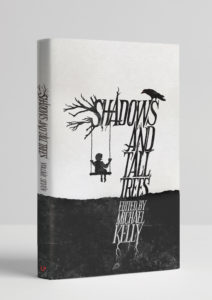
I’m polishing a novel full of wonder and invention, where the machines that make our dreams are assembled from meat and stardust. Everyone’s an orphan at The Eight Mile Suspended Carnival—by choice or circumstances. Everyone needs a home. The novel will trot out to seek publication shortly. I’m always working on some short essay or other, but the next big project will be another novel, which might or might not be loosely inspired by Stella Gibbons’ Cold Comfort Farm.
May 14, 2017
Dark Satanic Mills
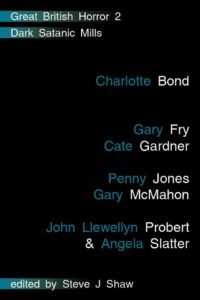 I’ve got a story in the latest anthology from Black Shuck Books, Great British Horror 2: Dark Satanic Mills. You can pre-order it now.
I’ve got a story in the latest anthology from Black Shuck Books, Great British Horror 2: Dark Satanic Mills. You can pre-order it now.
Thanks to Steve Shaw for inviting me and letting me be part of such excellent company.
Here’s the opening of my tale, “Our Lady of Wicker Bridge”:
There were stories about Wicker Bridge Estate, always had been even before there was an estate. So many stories and for so long that it was hard to tell if what you were being told was new or old. Something that smacked of urban legend might well have its roots in ancient tales of demons and spectres. Sometimes the true tales were worse: folk dying alone, left undiscovered for years, or eaten by beloved pets, only found when some number cruncher realised a gas bill hadn’t been paid for far too long.
Tricia had heard them all, retold a few in her time, but the one that occurred most often amongst the children she dealt with was this: if you were suffering, if you were alone and friendless, if you were desperate, a pale lady would appear and offer you a deal.
New Interview
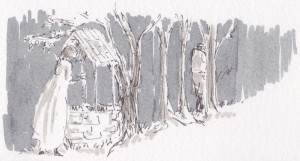
Art by Kathleen Jennings
The lovely Dr Nin Harris interviewed me over at Mythopoetic!
Thanks for letting me come and play!
What’s the best way for an author to start her day, according to Angela Slatter?
Coffee! Or the beverage of choice. And of course, this is all just how I start my day; everyone is different, but I try to start in a way that sets me up to go on in a productive manner. So: wake up, have breakfast, do 20 mins of yoga or a walk around the block. Come back, shower, put on real clothes so it feels like you’re going to do a job (not just sit at home in your PJs), then check your email and the internet for a mandated amount of time. Deal with the work emails, save the personal ones for later, don’t spend too much time on Facebook or Twitter for that way lies madness. Check your to-do list and start on the next project in order of deadlines proximity.
Don’t forget to stand up and walk around every half an hour or so to keep blood flowing, muscles moving and your back from seizing up. Make sure you have a lunch break, take it away from your desk and, again, have a mandated period of something not writing-related (like bad tv). Set an alarm so you get up and go back to work. Be wary of time as it’s a slippery thing!
The rest is here.
May 12, 2017
Locus Awards Finalists
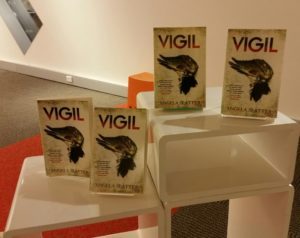 I’m delighted to see that Vigil has made the list of finalists for the 2017 Locus Awards! Great to see so many friends with wonderful books there too!
I’m delighted to see that Vigil has made the list of finalists for the 2017 Locus Awards! Great to see so many friends with wonderful books there too!
FIRST NOVEL
The Reader , Traci Chee (Putnam)
Waypoint Kangaroo , Curtis Chen (Dunne)
The Star-Touched Queen , Roshani Chokshi (St. Martin’s)
The Girl from Everywhere , Heidi Heilig (Greenwillow; Hot Key)
Roses and Rot , Kat Howard (Saga)
Ninefox Gambit , Yoon Ha Lee (Solaris US; Solaris UK)
Arabella of Mars , David D. Levine (Tor)
Infomocracy , Malka Older (Tor.com Publishing)
Everfair , Nisi Shawl (Tor)
Vigil , Angela Slatter (Jo Fletcher)
Check out the rest of the list, there’s some excellent company there.
May 9, 2017
Shadows & Tall Trees 7: Steve Rasnic Tem
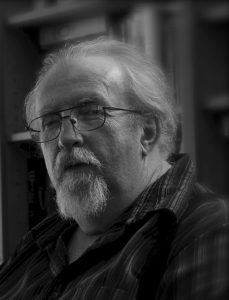 Steve Rasnic Tem’s last novel, Blood Kin (Solaris, 2014) won the Bram Stoker Award. His next novel, UBO (Solaris, Febuary 2017) is a dark science fictional tale about violence and its origins, featuring such historical viewpoint characters as Jack the Ripper, Stalin, and Heinrich Himmler. He is also a past winner of the World Fantasy and British Fantasy Awards. A handbook on writing, Yours To Tell: Dialogues on the Art & Practice of Fiction, written with his late wife Melanie, will appear soon from Apex Books. Visit the Tem home on the web at: www.m-s-tem.com
Steve Rasnic Tem’s last novel, Blood Kin (Solaris, 2014) won the Bram Stoker Award. His next novel, UBO (Solaris, Febuary 2017) is a dark science fictional tale about violence and its origins, featuring such historical viewpoint characters as Jack the Ripper, Stalin, and Heinrich Himmler. He is also a past winner of the World Fantasy and British Fantasy Awards. A handbook on writing, Yours To Tell: Dialogues on the Art & Practice of Fiction, written with his late wife Melanie, will appear soon from Apex Books. Visit the Tem home on the web at: www.m-s-tem.com
1.
What inspired your story in Shadows & Tall Trees 7?
“The Erased” began, as many of my stories do, with a vague, real-world perception of strangeness, which I then pursued into fiction. When friends my age (I turned 66 a few months ago)get together their conversations sometimes devolve into a small set of obsessional topics. It doesn’t seem to matter the level of education or sophistication, we find ourselves talking about our illnesses, acquaintances of similar age who have died recently, or recent changes in our environment: stores remodeled, streets altered, houses and businesses torn down, and the structures which have replaced them (for better or worse). You would think we would have become accustomed to these changes by this point in our lives, but often we seem surprised, sometimes even shocked. Something in our part of the world suddenly disappears, and we have to make the effort to readjust. Sometimes the adjustment doesn’t come without a struggle. Sometimes the weight of change feels like almost too much to bear. It reminds us how strange it is to be so mortal, so impermanent, while our minds seem capable of imagining “the forever.” An older friend and I were having one of those conversations about the neighborhood where I lived up until seven years ago (and the big old house where I raised my kids, built in 1898). When I moved away the newest house in the neighborhood was from the 1940s. Now, because of the recent huge demand for housing in Denver, they’re turning every garden lot and side yard into a housing lot, as well as tearing down older homes on big lots and replacing them with three or four units. All the new houses are in this “urban industrial” style—plain boxes with metal or wood panels attached in various configurations. The juxtaposition of these structures with those from the 40s, 30s, 20s, 1890s, feels, well, strange. And that’s the feeling I started with when I began “The Erased.”
2. Can you recall the first story you ever read that made you think “I want to be a writer!”?
It was a combination of two things really. In junior high I was reading my way through Jules Verne, and was especially taken with The Mysterious Island and its Robinson Crusoe-like ingenuity. I was also reading a huge volume of fairytales and fables—I don’t remember which one. But the combination of the two kindled an excitement in me about writing and telling stories.
3. What scares you?
Of the big, usual phobias, I’ve always been scared of heights. When I was young and had to go up a big staircase I was always afraid I’d trip, or do something crazy like leap off the side. It terrified me. When I became an adult, my biggest fear became the death of someone I love, and that remains my biggest fear today.
4. You can take five books to a desert island: which ones do you choose?
Two of the books would be by Cormac McCarthy: Sutree and Blood Meridian. After that, maybe Toni Morrison’s Beloved, The Collected Stories of MR James, and the Vandemeers’ giant anthology The Weird.
5. What’s next for you? 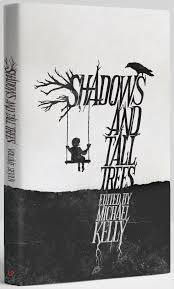
I’m working on an odd scattering of projects, but my two books coming out this year are probably the things that excite me most. Apex Publications is bringing out Yours to Tell: Dialogues on the Art and Practice of Writing, the last project I wrote with my late wife Melanie. It’s a handbook on writing fiction containing almost everything we’d learned about writing over the years. The other book is Ubo, my novel coming out from Solaris in February. Another decades-long project, Ubo is a blend of science fiction and horror, a meditation on violence utilizing such viewpoint characters as Stalin, Himmler, Charles Whitman, Jack the Ripper and Gilles de Raiis. I began it in the early 80s, and it was the most challenging thing I’d ever attempted. More problematic, however, was the fact that I had a 5- and an 8-year-old at home, and working on Ubo during the day and then playing with my children and reading them bedtime stories proved to be a wrenching experience. I put the manuscript aside. Over the years I’d pick it up again, until finally I felt sufficiently equipped emotionally and technically to complete it.



